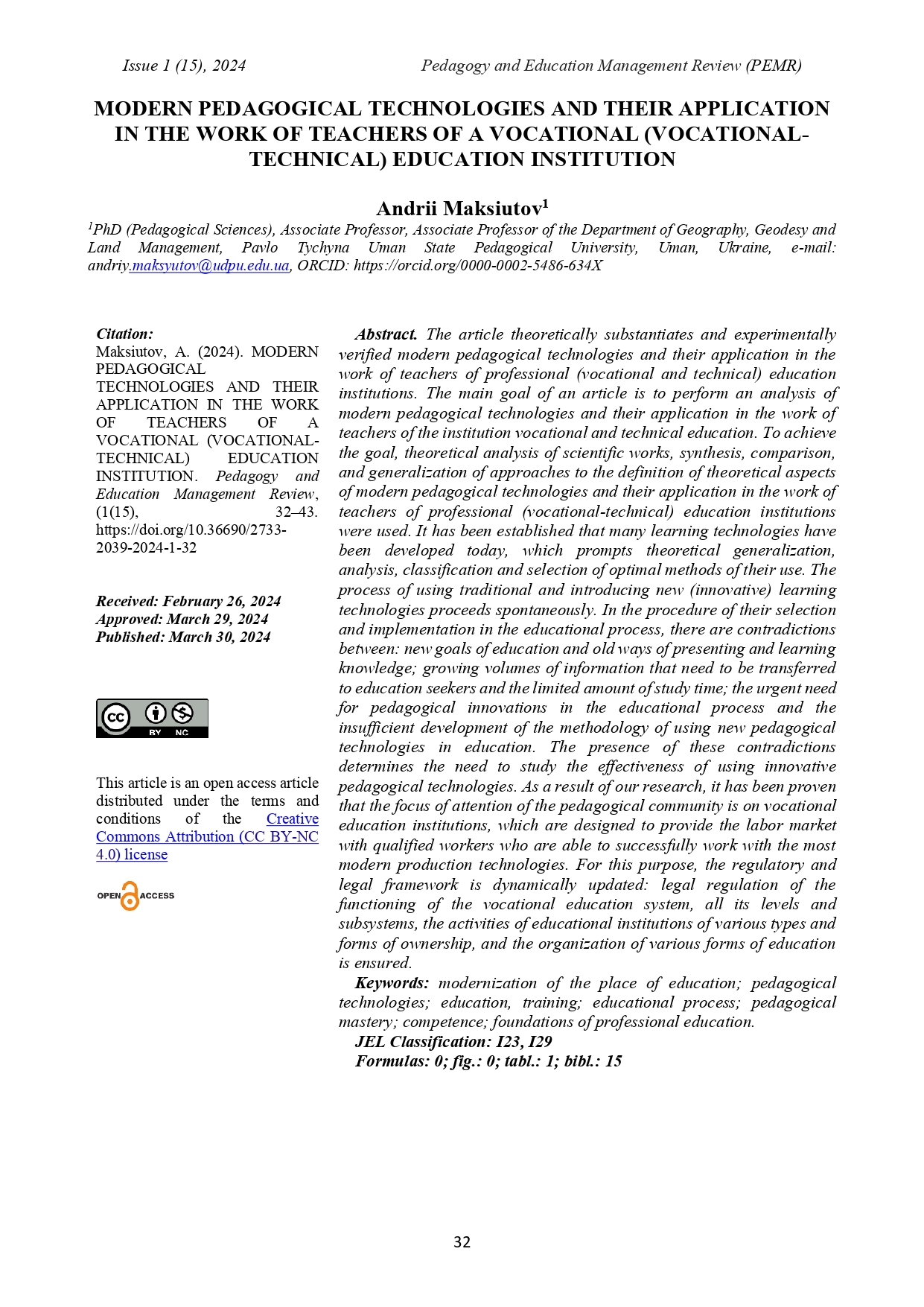MODERN PEDAGOGICAL TECHNOLOGIES AND THEIR APPLICATION IN THE WORK OF TEACHERS OF A VOCATIONAL (VOCATIONAL-TECHNICAL) EDUCATION INSTITUTION
DOI:
https://doi.org/10.36690/2733-2039-2024-1-32Keywords:
modernization of the place of education, pedagogical technologies, education, training, educational process, pedagogical mastery, competence, foundations of professional educationAbstract
The article theoretically substantiates and experimentally verified modern pedagogical technologies and their application in the work of teachers of professional (vocational and technical) education institutions. The main goal of an article is to perform an analysis of modern pedagogical technologies and their application in the work of teachers of the institution vocational and technical education. To achieve the goal, theoretical analysis of scientific works, synthesis, comparison, and generalization of approaches to the definition of theoretical aspects of modern pedagogical technologies and their application in the work of teachers of professional (vocational-technical) education institutions were used. It has been established that many learning technologies have been developed today, which prompts theoretical generalization, analysis, classification and selection of optimal methods of their use. The process of using traditional and introducing new (innovative) learning technologies proceeds spontaneously. In the procedure of their selection and implementation in the educational process, there are contradictions between: new goals of education and old ways of presenting and learning knowledge; growing volumes of information that need to be transferred to education seekers and the limited amount of study time; the urgent need for pedagogical innovations in the educational process and the insufficient development of the methodology of using new pedagogical technologies in education. The presence of these contradictions determines the need to study the effectiveness of using innovative pedagogical technologies. As a result of our research, it has been proven that the focus of attention of the pedagogical community is on vocational education institutions, which are designed to provide the labor market with qualified workers who are able to successfully work with the most modern production technologies. For this purpose, the regulatory and legal framework is dynamically updated: legal regulation of the functioning of the vocational education system, all its levels and subsystems, the activities of educational institutions of various types and forms of ownership, and the organization of various forms of education is ensured.
Downloads
References
Istoriia rozvytku profesiino-tekhnichnykh zakladiv osvity Ukrainy. URL: http://www.proftekhosvita.org.ua/uk/flatpages/information/history/ (data zvernennia: 28.11.2023). [in Ukrainian].
Kontseptsiia rozvytku profesiino-tekhnichnoi (profesiinoi) osvity Ukrainy. URL: https://zakon.rada.gov.ua/laws/show/1619-2021-%D1%80#Text (data zvernennia: 21.11.2023). [in Ukrainian].
Likarchuk I. L. Upravlinnia systemamy pidhotovky kvalifikovanykh robitnykiv v Ukraini: pedahohichnyi aspekt. Kyiv: Instytut pedahohiky i psykholohii profesiinoi osvity APN Ukrainy, 2020. 175 s. [in Ukrainian].
Lukianenko H. I. Problemy rozroblennia derzhavnykh standartiv profesiinotekhnichnoi osvity novoho pokolinnia. Tavriiskyi visnyk osvity. 2021. № 1. S. 65–74. [in Ukrainian].
Natsionalna innovatsiina systema osvity Ukrainy: problemy formuvannia ta realizatsii. https://zakon.rada.gov.ua/laws/show/1244-16#Text (data zvernennia: 21.11.2023). [in Ukrainian].
Nychkalo N. H. Transformatsiia profesiino-tekhnichnoi osvity Ukrainy: monohrafiia. Kyiv: Pedahohichna dumka, 2018. 200 s. [in Ukrainian].
Pro zatverdzhennia Derzhavnoi tsilovoi prohramy rozvytku profesiino-tekhnichnoi osvity na 2015–2025 roky. Postanova Kabinetu Ministriv vid vid 13 kvitnia 2011 r. № 495. URL: http://ovu.com.ua/articles/10603-pro-zatverdzhennyaderzhavnoyi-tsilovoyi-programi (data zvernennia: 26.11.2023). [in Ukrainian].
Puzanov M. F. Narysy istorii profesiino-tekhnichnoi osvity v Ukrainskii RSR. Kyiv: Vyshcha shkola, 2020. 232 s. [in Ukrainian].
Shcherbak O. I. Innovatsii u systemi profesiino-tekhnichnoi osvity Ukrainy: monohrafiia. Kyiv: VTs «Prosvita», 2018. 123 s. [in Ukrainian].
Vakarchuk I. Suchasni tendentsii rozvytku profesiino-tekhnichnoi osvity: priorytety ta zavdannia. Osvita Ukrainy. № 63–64. 2018 р. 41 s. [in Ukrainian].
Nychkalo N. H. Rynok pratsi i problemy modernizatsii pidhotovky kvalifikovanykh robitnykiv. Profesiino-tekhnichna osvita. 2020. № 1. S. 4–9. [in Ukrainian].
Lyulenko S.O., Honcharuk V.V., Podzerey R.V., Dekarchuk M.V. creation of a health-preserving educational environment as the main prerequisite for strengthening personal health. Science and technology today ("Pedagogy" Series, "Law" Series, "Economics" Series, "Physical and Mathematical Sciences" Series, "Technology" Series). Vol. No. 7(21) 2023. P. 383-393. [in Ukrainian]. URL: http://perspectives.pp.ua/index.php/nts/article/view/4848
Makogonchuk, N.V., Honcharuk, V.V., Kazak, Yu.Yu., Parakhnenko, V.H. (2023). Professional development of a teacher's personality in the conditions of scientific and pedagogical education. Perspectives and innovations of science ("Pedagogy" Series, "Psychology" Series, "Medicine" Series): magazine. No. 10 (28), 2023. P. 286-299. [in Ukrainian]. URL: http://perspectives.pp.ua/index.php/pis/article/view/5157/5187
Chychuk, A.P., Honcharuk, V.V., Kvasnyuk, V.V., (2024). DEVELOPMENT OF INFORMATION COMPETENCE OF SPECIALISTS IN THE EDUCATIONAL ENVIRONMENT. Proceedings. Series: Pedagogical sciences. Issue 6 / Ed. coll.: V.F. Cherkasov, O.A. Bida, N.I. Shetel and others. Uzhhorod-Kropyvnytskyi: "Code" Publishing House. 2024. P. 43-47. [in Ukrainian].
Honcharuk V.V., Dekarchuk M.V., Martynenko O.M., Syzykhin S.V. Peculiarities of the formation of professional values and motives in students of higher education. Scientific innovations and advanced technologies (Public Administration Series, Law Series, Economics Series, Psychology Series, Pedagogy Series): journal. 2022. No. 4(6) 2022. P. 58–71. DOI: https://doi.org/10.52058/2786-5274-2022-4(6)-58-70







